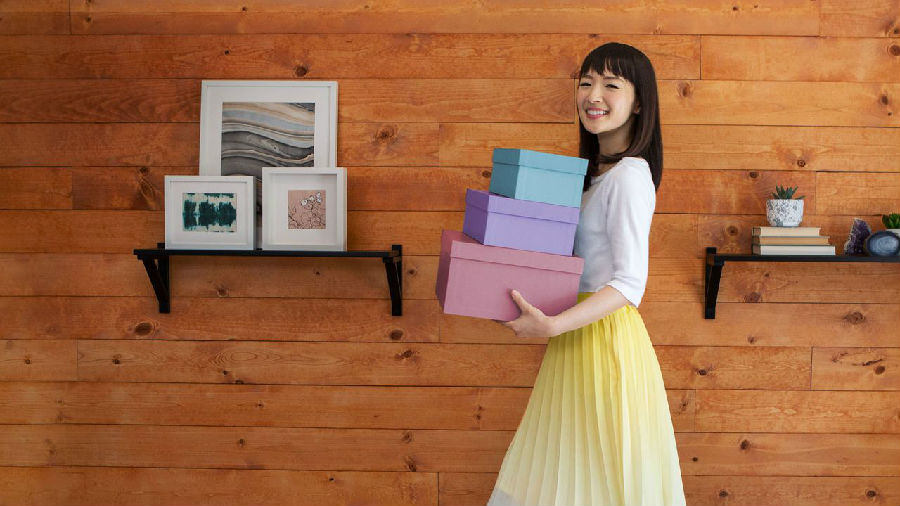斷舍離:收拾家也有大學(xué)問(wèn)
Few of us enjoy sorting out messy closets and being reminded of the quantity of useless stuff we own. But perhaps we can get some help from Marie Kondo, the famous Japanese tidier, to make our tidying up that bit easier.
沒(méi)有多少人喜歡整理凌亂的衣柜,還被吐槽屯了許多沒(méi)用的東西。但我們或許能向日本著名收納達(dá)人近藤麻理惠學(xué)上幾招,讓收納變得更簡(jiǎn)單。
Like her 2012 New York Times best-selling book, The Life-Changing Magic of Tidying Up, her new hit show on US media service Netflix, Tidying Up with Marie Kondo, is about helping people to tidy up their homes and transform their lives in the process. The show has started a social media craze. Under Kondo's inspiration, many people are posting pictures of their tidy drawers and closets.
她2012年所著的《怦然心動(dòng)的人生整理魔法》成為《紐約時(shí)報(bào)》暢銷(xiāo)書(shū),而她在美國(guó)媒體服務(wù)商網(wǎng)飛上推出的全新熱播節(jié)目《麻理惠的整理秘訣》也幫助人們進(jìn)行家居收納,并在此過(guò)程中改變?nèi)松9?jié)目在社交媒體上掀起一輪狂潮。許多人受到近藤的啟發(fā),紛紛曬出自己整潔的抽屜和衣柜的照片。
The tidier starts each cleaning-up task by sitting on the floor, quietly communicating with the house. For her, organizing is not just about tidying up, it has a higher spiritual meaning.
這位收納達(dá)人每次在開(kāi)始整理前,都會(huì)坐在地板上,和房子安靜地對(duì)話。對(duì)她而言,收納并非只是打掃整理,還有著更深層次的精神意義。

Deciding what to keep and what to throw away has more to do with the emotion an object inspires – whether it "sparks joy", as she often says. For example, we see on the show how, with Kondo's help, a sad widow got a fresh start after she learned how to properly store her purses, make a memory box and say goodbye to unneeded things.
就像她常說(shuō)的那樣,決定哪些東西該扔,哪些東西不該扔更多地取決于這一物品所帶來(lái)的情感 —— 它是否能“產(chǎn)生快樂(lè)”。比如,我們?cè)诠?jié)目中看到,在近藤的幫助下,一位憂傷的喪偶女士學(xué)會(huì)了如何合理收納自己的手袋,制作回憶寶盒,與不需要的東西告別,從而開(kāi)始全新的生活。
"Kondo guides people who are at a crossroads and resolved to finally tackle the mess blocking their joy, transforming lives in emotional and surprising ways," Netflix said.
“近藤引導(dǎo)了那些站在人生十字路口的人們最終下定決心,處理讓他們不快的混亂狀態(tài),以出人意料的方式從情感層面上改變他們的人生,”網(wǎng)飛表示。
According to Kondo, making space for the things we need every day can reduce our stress and give us more time to enjoy what we really love. "The objective of cleaning is not just to clean, but to feel happiness living within that environment," Kondo wrote in her book. She added: "Tidying is magic. It will open up your life to true joy."
近藤認(rèn)為,為每日所需的事物騰出空間能夠減少壓力,并讓我們有更多的時(shí)間做自己真正喜歡的事情。“打掃的目標(biāo)并不僅僅是打掃,而是要對(duì)生活在這樣的一個(gè)環(huán)境中感到幸福,”近藤在書(shū)中寫(xiě)道。她還補(bǔ)充道:“收納是種魔法,能夠?yàn)槟愕娜松鷰?lái)真正的快樂(lè)。”
Yet not everyone buys her idea that tidying up can change our lives. "I'm still the same person who hates doing dishes even after I cleaned my house," Val Bromann, a US digital marketer, told Vox website.
但并非所有人都認(rèn)同她的“收納改變?nèi)松闭摗!按驋吡朔孔雍螅疫€是那個(gè)討厭刷碗的人,”美國(guó)數(shù)字營(yíng)銷(xiāo)人士瓦爾·布羅曼在接受Vox網(wǎng)站采訪時(shí)如此表示。
It's true that we all have our own tidiness model. But without doubt, mess is often about unhappiness, and the right kind of tidying can be therapy for the people in a home as much as it is a practical everyday skill.
的確,我們每個(gè)人都有著自己的一套收納模式。但毫無(wú)疑問(wèn)的是,臟亂往往伴隨著不快,而正確的收納方式可以治愈家中人心,也是個(gè)實(shí)用的日常技能。












